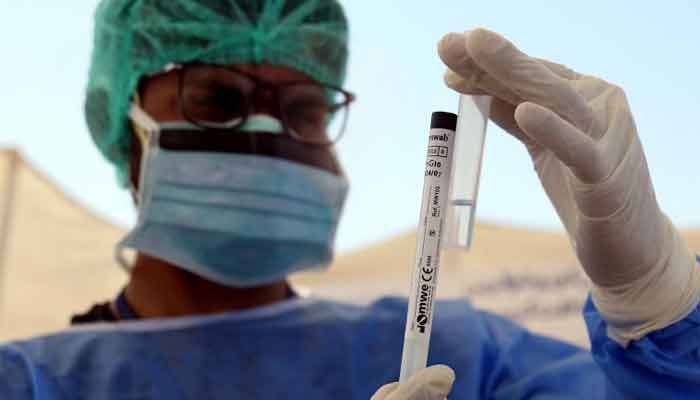COVID-19: Data shows Pakistan utilising only a third of its testing capacity
Pakistan has a testing output of 71,780 tests per day for the virus at its 133 laboratories
Pakistan has a capacity of conducting over 70,000 coronavirus tests per day but due to multiple reasons, it is utilising only 42% of its capacity, according to the data of the ministry of national health services regulation and coordination, compiled by Geo.tv.
For the 18th consecutive day on Tuesday, testing in the country registered a reduction after hitting a record-high on June 19, the data revealed.
The ministry, which provides daily statistics of the outbreak, noted that on July 7 Pakistan carried out 21,951 tests across the country, which is only 30% of its total testing capacity.
As per the National Command Operation Center (NCOC), Pakistan has a testing output of 71,780 tests per day for the virus at its 133 laboratories.
A further breakdown of the testing numbers highlights that Pakistan tested its highest coronavirus samples to date on June 19, of over 31,000.
Since then, the test numbers have dropped daily, tumbling to its lowest on June 29, of only 20,930 tests. While on other days, Pakistan utilized between 29 to 42% of its testing capacity across the country.
The largest drop in diagnosing samples was witnessed in Punjab, where only 7,659 tests were carried out on Tuesday, 44% of the province’s capacity.
Testing in Sindh also slid, falling to 9,317 tests per day, compared to the previous day when it tested over 12,000 specimens. The province's testing capacity has continued to fluctuate between over 13,000 in late June to more than 9,000 tests per day on Tuesday.
| Date | Test Numbers |
| June 19 | 31,681 |
| June 20 | 28,855 |
| June 21 | 30,520 |
| June 22 | 24,599 |
| June 23 | 23,380 |
| June 24 | 21,835 |
| June 25 | 21,041 |
| June 26 | 21,033 |
| June 27 | 25, 013 |
| June 28 | 23,009 |
| June 29 | 20,930 |
| June 30 | 22,418 |
| July 01 | 22,128 |
| July 02 | 22,941 |
| July 03 | 22,050 |
| July 04 | 25,527 |
| July 05 | 22,271 |
| July 06 | 24,577 |
| July 07 | 21,951 |
-
Antioxidants found to be protective agents against cognitive decline
-
Coffee reduces cancer risk, research suggests
-
Keto diet emerges as key to Alzheimer's cure
-
What you need to know about ischemic stroke
-
Shocking reason behind type 2 diabetes revealed by scientists
-
Simple 'finger test' unveils lung cancer diagnosis
-
Groundbreaking treatment for sepsis emerges in new study
-
All you need to know guide to rosacea












